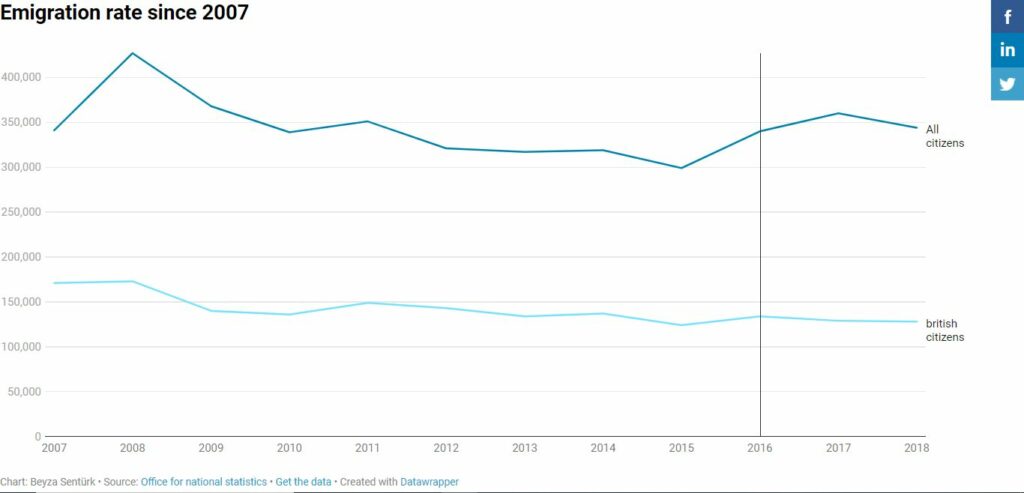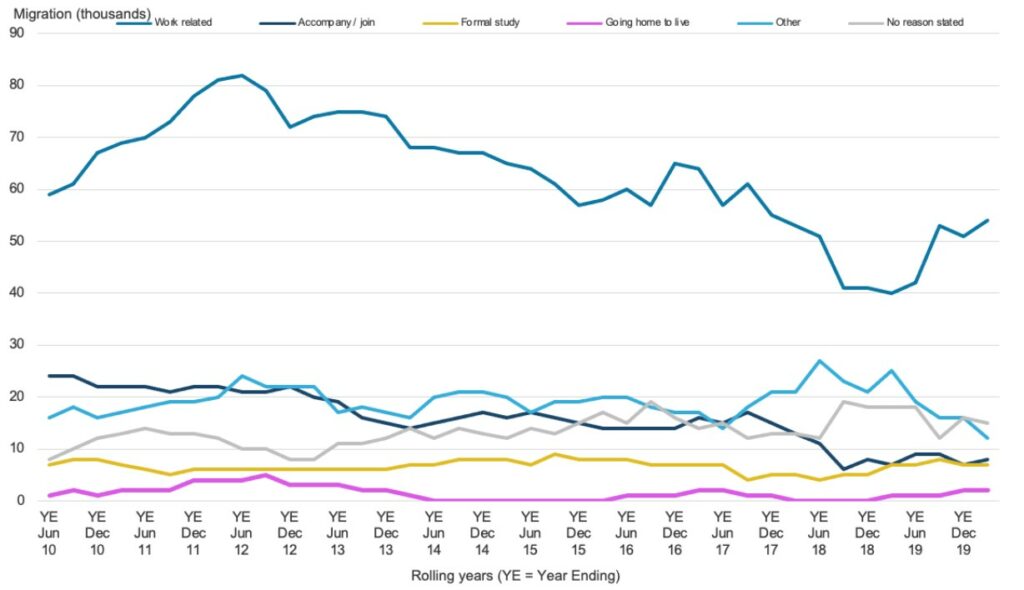The German News Show “Tagesschau“ claimed that after Brexit Referendum Brits move to an EU country. Although our research proved the fact true, we decided to classify the claim as mostly true because there are several Brits who left the UK before Brexit or had other reasons to leave the country.
Due to the upcoming final Brexit on the first day of 2021, the German news broadcast “Tagesschau“ published a report in which they said that “After Brexit Referendum Brits move to an EU country“. The report also suggests the reasons for leaving the United Kingdom that are mostly justified by Brexit and its consequences for the citizenship of Great Britain.

The History and Impact of Brexit
Four years passed by since the Brexit referendum on June 23rd 2016. 52 percent of the British population voted for an exit out of the European Union. A lot of negotiations have happened between the EU and Great Britain over the years and on february 1st 2020 the euro exit was completed. The Brexit transition is on january 1st 2021. Even though there are still economic negotiations going on between the United Kingdom and the European Union, it seems like the UK is leaving the EU without a trade agreement. The “hard Brexit” would become reality. In that case the UK has to reassemble itself economically. It’s unclear how the countries will deal with these economical losses in the future which could lead to existential fear in the British population.
The number of emigrants increases
In order to make a statement about the influences of the Brexit referendum on the UK migration, we have to take a look at the migration statistics, published by the office for national statistics.
Regarding the quarterly report from august 2020, figure 1 shows a slight increase of the emigration rate since the referendum in June 2016.
Referring to figure 1, it shows the emigration behaviour of all the citizens in the UK but it is important to distinguish between a British citizenship and a non British citizenship.

This diagram shows a difference between all citizens living in the UK and only British citizens. While the line of all civilians tends to increase since the Brexit referendum 2016, the emigration rate of the British remains stable.
But why is that? Since 2016 “the largest change in the number of people leaving the UK was from EU citizens, increasing by 29 percent to 123,000” according to the Office for National Statistics.
To understand the impact of the Brexit transition on the British population, it is more important to look at the shifting of citizenship. Even though there isn’t an increase of the emigration rate noticeable, more British citizens decided to change their citizenship. According to the statistical office of the European Union the number of the loss of citizenships by sex and new citizenship increased since the referendum in 2016.
This is also shown in the naturalisation statistic in Germany. The application rate of UK civilians increased from 600 applications in 2015 to 2,900 applications in 2016 again to 7,500 in 2017 up to 14,900 in 2019.
Referring to the Office for National Statistics, the Brexit referendum isn’t the only reason for people to leave the UK.
Taking a look at graphic 1, it is also important to mention the rapid increase in 2008. According to the results of the Office for National Statistics, the main reason for people leaving the UK for a year or more during the time of the financial crisis is because of work, either because of a “definite job” or because of “looking for work”. The rate of all citizens leaving went over 400,000 and never got even close to that number again in the years after until today.
What other reasons exist for people to abandon the United Kingdom?
Reasons for leaving
When talking about reasons for people to leave the UK, it is important to take a look at the International Passenger Survey (IPS) estimates. The IPS asks people leaving the UK for a year or more what is their main reason for emigrating, and their responses are categorised by their main intended activity when abroad such as ‘work related’ or ‘study’.
We contacted Dr. Rhiannon Brook, the research officer at the Centre for International Migration, who took part in the IPS estimates and provided us with this information.
According to those studies, the main reason for British citizens to leave the UK for a year or more is “work related”. Either because of a “definite job” or because of “looking for work”. Since 2016, after a slight increase between June and December, the numbers of people leaving because of work decreased until 2018. From 2018 onwards, there is an increase observable.
The second reason for people leaving are “other” reasons. The number of those increased since 2016 up to almost 30 thousand in 2018 but increased steadily since then.
The Reasons “formal study” and “going home to live” remained stable over the years since 2010 and never reached the number over 10 thousand.
“No reason stated” slightly increased from 2010 until June 2016, since then it mostly remained stable between the numbers of 10 to 20 thousand.
The last reason possible to choose according to IPS is “accompany/join” someone in another country. Since 2010 it decreased from about 25 thousand to about 8 thousand in the end of 2018, after that it mostly remained stable.
According to Dr. Rhiannon Brook, from this they “cannot say whether Brexit is the reason for an individual leaving the UK”. These numbers only include people with a British citizenship.
Looking at the WZB Study (Berlin social science Center), a quantitative survey about UK citizens living in Germany, it shows “that uncertainty about the political, economic, or social state of a home country can trigger migratory behaviour” (Auer 2020 p.6). It says that the uncertainty created by the Brexit referendum had a bigger influence on migration decision making than the uncertainty that comes with migration itself.
Yet there are no specific numbers about people leaving the UK, who state “Brexit” as a reason.

more is “work related”.
Importance of Covid-19
Because the Covid-19 pandemic is so current, there isn’t a lot of information published to talk about the impact of the coronavirus on the migration in Great Britain.
According to a survey about the coronavirus and the social impacts on Great Britain from 11 to 15 november, published by the Opinions and Lifestyle Survey (COVID-19 module), the coronavirus does have an impact on the future plans of the UK population.
Out of 1.2 million citizens who are considering living outside the UK in the next 12 months, fifteen percent state that because of “worries about the coronavirus (Covid-19) pandemic. That contains over 180 thousand people.
Difficulties in elucidating the claim
In the beginning of the research, the amount of current and useful statistics about emigration in the UK was not enough to work with. Also, it was difficult to separate the claim, which was the headline of the report , from the rest of the report. The first sentence of the intro of the report starts with “Zuerst verlässt Großbritannien Europa” (English: “First, Great Britain leaves Europe”) which is in fact false and also confusing because Great Britain can not leave the continent.
The lack of statistics about emigration in the UK was not a problem later, though it was not possible to consult facts and figures about the influence of Brexit on the emigration decisions. In other words, the turning point Brexit in 2016 was not a good time to concentrate on due to a small amount of statistics or figures. Therefore, interpretations were difficult to make in our early stages of fact checking. That also affected our conclusion.
Conclusion
Basically the claim from the “Tagesschau” is considered as true because there are surely more emigration flows from the UK to other EU countries like Germany. It is important to mention that a lot of those people were citizens with a European citizenship that decided to return home. Even though there is no increase of the emigration behaviour of people with a British citizenship noticeable, it’s safe to say that the applications for naturalisation of British citizens in European countries increased rapidly since 2016.
It is also occupied that many British citizens are not sure whether their country will offer them a place to live and to work although Great Britain is no longer a member of the European Union.
In short, we can notice an increase of the emigration rate in the UK. However we can´t clearly say that emigration is completely forced by Brexit. Therefore the statement is mostly true.
RESEARCH | ARTICLE © Beyza Sentürk and Marlon Esch
Leave your comments, thoughts and suggestions in the box below. Take note: your response is moderated.





